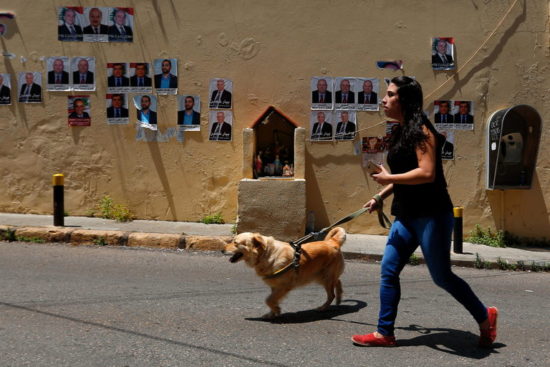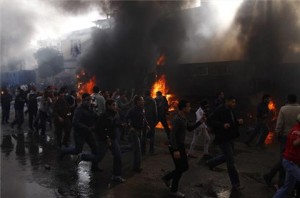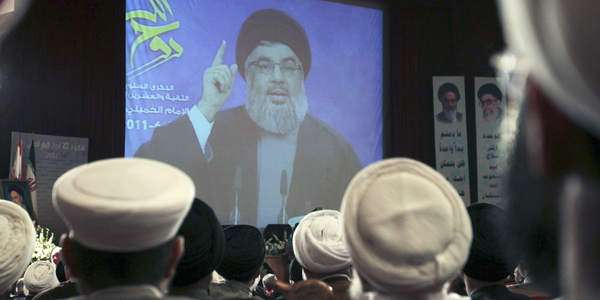Beirut Upstarts Gain Traction in Lebanon’s Political Quagmire

A Beirut polling station on Sunday, May 8. Photo: Hassan Ammar/Associated Press
[Published in The New York Times.]
BEIRUT, Lebanon — A group of Lebanese professors, architects and filmmakers have fashioned an unlikely alternative to the bickering feudal political bosses who for decades have kept their country mired in stalemate. Their bid for power seemed quixotic at first.
But it touched a nerve in Beirut’s municipal elections this week, gaining unexpected traction with voters and fueling the upstarts’ conviction that it is possible to buck the Arab world’s trend toward authoritarianism.
“You can’t just demonstrate and get tear-gassed,” said Jad Chaaban, an economics professor at the American University of Beirut who helped hatch the technocratic political movement, called Beirut, My City. “We need people like us in power.”
The party’s members took on Lebanon’s political bosses in an election with high symbolic value but with little actual power at stake. The city government has a modest budget and limited influence over planning in the city, the country’s capital, but most authority rests with the national government, still securely under the control of the feudal establishment.
Beirut residents voted on Sunday, but officials did not release results until Tuesday. Beirut, My City won about 40 percent of the vote, just a few points behind the establishment slate. Because there is no proportional representation, the winner takes all 24 seats on the council.
Beirut, My City successfully framed its shoestring campaign as part of a broader struggle to rid Lebanon of its corrupt leaders and show the Arab world how to change an established order without toppling into violence and chaos.
Lebanon’s warlords ended a 15-year civil war in 1990 with a sectarian power-sharing agreement. Any faction can veto government decisions, and no single group can dominate the state.
Despite their differences, groups as diverse as the Shiite group Hezbollah, the Sunni Future Movement and Christian warlords once allied with Israel support a system that allows them to divide the spoils of patronage without any oversight. Gerrymandering and rigid election laws make it almost impossible for independent political parties to challenge the sectarian factions at the national level. But municipal elections are, at least in theory, supposed to be nonsectarian, giving an opening to Beirut, My City.
Establishment leaders followed an old formula to fend off the challenge, contending that without them and their power-sharing deals, everything could fall apart, plunging Lebanon back into civil war.
This year’s municipal campaign starkly challenged that orthodoxy. Beirut, My City published a detailed platform focused on quality-of-life issues like traffic, garbage pickup and access to parks. The group refused help from any veteran politicians, and ran a slate of candidates evenly divided between men and women, Muslims and Christians.
Saad Hariri, a former prime minister and a dominant Sunni politician, led an establishment campaign that warned ominously that unknown forces wanted to “harm Beirut and break the parity” among the city’s sects. In a sign that the dominant leaders took the threat seriously, traditional rivals set aside their differences to run in a coalition against the upstarts called the Beirutis.
Many Lebanese, even those angry about endemic corruption, fear that change could be destabilizing, and feel compelled to vote for their sect’s traditional leaders.
“We don’t trust anyone, but we’ll vote for Hariri in order to show that we exist,” said Ahmed Shara’i, a store owner in the Sunni stronghold of Tarik Jadida, who said he moonlighted as a local militia chief.
His poor and marginalized neighborhood has suffered decades of institutional neglect, Mr. Shara’i said. “With the leaders we know, we’re still losing,” he said. “Imagine how much more we lose if they’re gone.”
His rationale neatly summed up how a system survives even though few profess to like it.
Since 2011, Lebanon has emerged relatively unscathed from the types of crises that have led to war or dictatorship in nearby countries. The country’s bosses managed to keep their followers quiet during a series of bombings and assassinations, sectarian clashes and the arrival of more than 1.5 million Syrian refugees in a country with a population of about four million.
But it is also clear that Lebanon’s recipe is not working. The country has been without a president for two years, and Parliament has unconstitutionally extended its term; the local elections this year are the only polls of any sort since 2010.
Public anger reached a boiling point last summer, when the government failed to renew the nation’s waste collection contract amid allegations that Mr. Hariri was benefiting from a secret deal.
As the garbage piled up, a movement called “You Stink” organized the biggest protests in Lebanon in a decade. Technocrats including Mr. Chaaban, the economics professor, grew frustrated when their detailed proposals to address the garbage crisis were ignored, and decided to go one step further and form a political party.
Nine months later, rotting piles of uncollected waste spew clouds of gas that smells like vomit over the city’s fanciest neighborhoods, while the politicians responsible for the debacle remain in office. But supporters of Beirut, My City believe they have begun something new and lasting.
“They’re afraid of us!” Elie Haddad, an engineer who helped the campaign, said with a laugh. Outside a polling place in West Beirut, he and other volunteers in white T-shirts distributed lists of the candidates for Beirut, My City. They were outnumbered almost 10 to 1 by volunteers for the well-funded Beirutis coalition, in red shirts and baseball caps, who displayed noticeably less zeal.
“There’s no such thing as a volunteer — we’re all paid to be here,” said one of them, Abdelrahman Harb, 34, who was sitting in the shade of a rubber tree with his wife and some friends rather than canvassing voters for the establishment list.
“They can pay for us, but they can’t make us vote for them,” Mr. Harb said, slyly pulling a copy of the Beirut, My City list from his pocket. “We’re ready for a change.”
The civil campaign’s goals are notably modest, and are very much a product of Lebanon’s unusual political environment. The establishment that has run Beirut for the last 10 years faces newly energized scrutiny. “We’ve opened a Pandora’s box,” said Ibrahim Mneimneh, an engineer and the head candidate for Beirut, My City. “We gave people a space to talk. People want to give a slap in the face to their sectarian leaders without taking a huge risk for the country.”
The campaign featured a rarely seen shift from protest to hardball politics. The new party fleshed out detailed policies, and then tried, albeit it with limited success, to build an electoral machine that reached the street and neighborhood level.
Candidates directly attacked corrupt deals, many linked to Mr. Hariri, that have in recent years cut off public access to waterfront land and degraded the quality of water, power and other services in the capital. The civil campaign held forums in Beirut’s few public spaces to call attention to their neglect and to a lack of green space.
Parliamentary elections are expected within the next year, and many supporters of Beirut, My City want to expand the party nationwide.
“They are well organized, and they have content,” said Ziad Baroud, an influential critic of government policy who served as Lebanon’s interior minister from 2008 to 2011. The group delivered a clear message to the establishment, he said: “You failed; you didn’t do much. We have policies, we have a program.”
“They are into politics,” he said of Beirut, My City. “That’s why they made it.”
Processing the Arab Revolts
While finishing work on my book manuscript I came across this video from an October 2013 talk I gave at Claremont MacKenna College. I share it here mainly so that my mother can watch it, but it captures my thinking at a moment when the forces of reaction were consolidating power and crushing dissent across the Arab region. This talk was one of my first attempts to synthesize the different regional events and at the same time find some reason to remain hopeful. Four months later there’s even less reason to retain even a shred of optimism.
Hezbollah’s Legitimacy Under Threat
Just a year ago, Hezbollah was sitting pretty. Lebanon’s Party of God had consolidated its influence across the Arab world with a durable set of alliances. Its Axis of Resistance, formed with Iran, Syria and Hamas, had emerged as the most credible and authoritative force in Middle Eastern politics. Its central idea—to mobilize self-reliant communities around a frontal confrontation with Israel—seemed to be setting the region’s agenda.
But the Arab Spring changed the rules of the game that Hezbollah so masterfully played for the last two decades. Today, the party faces perhaps the biggest threats to the legitimacy it has worked so hard to cultivate among cadres, casual supporters and even the political opponents who have come to grudgingly respect the effectiveness of its leader, Hassan Nasrallah.
The first, and more short-term, challenge comes from Syria, where a tottering Assad regime could severely curtail Hezbollah’s military room for maneuver. The second, more enduring, issue is the Arab political renaissance underway, which could produce movements well positioned to steal Hezbollah’s anti-Israel thunder with a resistance program free from the party’s sectarian, militant baggage.
Hezbollah Is In Trouble
During the six turbulent years since Rafik Hariri was blown up on the Beirut waterfront, supporters of the outspoken billionaire former prime minister longed for the day that his killers would face justice.
But the indictments submitted this week by the UN-mandated Special Tribunal for Lebanon hit with more splutter than splash. In the short term, Hezbollah will face minimal fallout from the charges against two of its officials, which the Tribunal named as ringleaders in the assassination.
The more serious threats to Hezbollah’s primacy in the long run lie elsewhere. The first comes from the Tribunal, which will exert leverage over Lebanon not by the suspects it indicts but by the strength of the case it presents. The second and perhaps more important challenge to Hezbollah stems from the radical political changes sweeping the Arab world, which threaten its Syrian government sponsors in Damascus, and have put Hezbollah in the position of siding with authoritarian dictators in the era of the Arab spring.
Read the rest in The Atlantic.
History’s Side in Egypt
 The popular uprising in Egypt today will conclusively change the political dynamics in the most populous Arab country, no matter what the short term outcome. Hosni Mubarak might hang on to the presidency for some time, but the parameters have radically changed. (I can’t take my eyes off Al Jazeera.)
The popular uprising in Egypt today will conclusively change the political dynamics in the most populous Arab country, no matter what the short term outcome. Hosni Mubarak might hang on to the presidency for some time, but the parameters have radically changed. (I can’t take my eyes off Al Jazeera.)
In August and September, all the Egyptians I interviewed about their country after Mubarak ruled out mass protests as even a remote possibility – especially mass protests not organized by the Muslim Brotherhood.
But that’s exactly what we’ve seen now; tens of thousands of people, maybe more, in virtually every major Egyptian city, willing to march and knock heads and risk death to call for an end to Mubarak’s rule. They’re not doing it under the banner of the Muslim Brothers or of the small, organized secular opposition.
So one shibboleth of Egyptian politics has been cast aside: the Egyptian people are capable of revolt.
What follows will depend on many factors: the endurance and persistence of the protestors; the choices of influential politicians, in and out of the regime; and most of all, I think, the choices the military makes.
Right now, police and intelligence run Mubarak’s police state. The military governs its own fiefdom, and considers itself the steward of the nation’s sovereignty. As retired General Hosam Sowilam told me this summer, in a time of transition the military “shall obey the president because he will be accepted by the people. But we will not accept any interference by the political parties into our military affairs.”
If the people withdraw their support from Mubarak, I guess the military will see its advantage in standing with them and not with the regime. In terms of bald self-interest, the military will want to maximize its influence with whomever follows Mubarak. That’s similar to the choice Tunisia’s military made.
A handful of power centers can play a role in crafting an alternative to Mubarak’s rule: Egypt’s intelligence chief; the military; the interior ministry; and to a lesser extent the institutions of civil society, both pro- and anti-regime: the NDP, the Muslim Brotherhood, the secular opposition parties, the protest movement, ElBaradei’s organization. Only the military has the weight to tilt the balance on its own.



